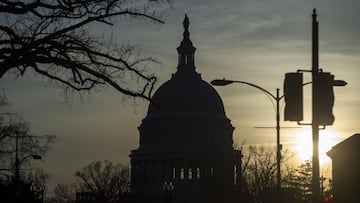$3,000 third stimulus check per child: is there a maximum number of children to request it?
House Democrats have unveiled a new bill as part of the coronavirus relief bill expanding the child tax credit for one year including monthly payments.

Democrats on the House Ways & Means Committee released their opening proposal for increasing and expanding the child tax credit. The bill follows the general framework laid out in President Biden’s American Rescue Plan. The bill would increase the amount families could claim per child and expand eligibility to lower income households for the 2021 fiscal year.
An added benefit to the proposal for American families, part of the enhanced child credit would be paid in advance starting in July running through December. Furthermore, the enhanced child credit would be refundable, meaning that families would be able to receive the credit even if they pay less in taxes than the credit itself.
How much is the proposed child tax credit and how many children can individuals claim?
The new proposal for the enhanced child tax credit would increase the current annual amount from $2,000 to $3,000 for each child ages 6 to 17, and $3,600 to each child under the age of 6. There is no limit on the number of children a family can claim for the enhanced child credit, in the new proposal 17-year-olds would now be eligible for the enhanced child credit, under the current law they are not.
How can families claim the enhanced child credit?
The proposal calls on the IRS to distribute the direct payments much like the stimulus checks were. The agency will use taxpayers’ income-tax filings from the previous year to determine eligibility. The bill gives the IRS until July to program its computer systems to handle the task of sending out the payments.
Half the enhanced child credit would be paid in advance as monthly payments of $250 and $300 per child respectively per month in direct payments to families for 6 months through December. Given the scale of the task and timeframe, the IRS could change the frequency of the payments from the desired monthly schedule under the proposed bill.
The remainder of the enhanced child credit due could then be claimed on taxpayers' filings in 2022 for the 2021 fiscal year.
- When will the $3000/$3600 child tax credit arrive?
- Are children aged 17/18 included in $3,000 stimulus check?
- $3,000/$3,600 child tax credit: who would get it?
The bill calls for flexibility for beneficiaries
The legislation is also calling for the creation of an online portal where beneficiaries could change their status as their financial or family situation changes. Since the payments would go out in advance based on a taxpayer's previous income-tax filing there are worries that taxpayers would be penalized after the fact.
To alleviate this worry, the legislation creates a “safe harbor” provision, whereby parents who are mistakenly sent the benefit will not be penalized. Should their family or economic situation change making them ineligible they would not be made to pay back the money at the end of the year.
What are the eligibility requirements for the $3,000/$3,600 child tax credit?
Under the current law’s work requirements, lower income families were excluded from the child tax credit. The expanded eligibility is designed to lower child poverty in the US. The bill introduced by the House Democrats eliminates the current earnings floor whereby a family must earn a minimum of $2,500 per year to even qualify for the child tax credit. The proposal also makes the enhanced child credit fully refundable instead of a maximum refund of $1,400.
For families with higher incomes, under the current tax law, the size of the benefit phases out for individual taxpayers that have an adjusted gross income over $200,000. Under the new bill the enhanced child credit would phase out for individuals with incomes over $75,000. For families above the threshold that aren't eligible for the enhanced child credit they would still be able to claim the $2,000 child tax credit under the current rules.
- When to file your tax return if you have received a stimulus check?
- Third stimulus check: what happens next?
- Biden sticks by $1400 amount for third stimulus check
Democrats to move quickly on legislation
House Speaker Nancy Pelosi has said that she wants to get the covid-19 relief bill passed through the House in the next two weeks. The Democrats, with a slim majority in the House, are prepared to go it alone bypassing the need to garner any Republican votes. They have approved using the budgetary tool known as ‘reconciliation’, which would require only a simple majority in the Senate to pass the final legislation.
In the Senate, the Democrats need to keep their own caucus onboard with the final covid-19 relief bill. They will need all 50 senators to vote in favor of the bill to ensure it passes with Kamala Harris casting the tiebreaking vote. By setting an upper limit on who would benefit from the expanded measure they hope to keep more conservative Democrats’ votes.
Democrats are pushing to pass the bill before unemployment benefits and other pandemic-related programs expire in Mid-March. The timeline could be slowed down by former President Trump’s second impeachment hearing set to begin Tuesday, 9 February.
Alternate proposals to the enhanced child tax credit
Although generally opposed to the size of the overall package that Democrats are proposing there was a surprise proposal from Mitt Romney for an even larger child benefit. However his proposal on Thursday met with criticism from his GOP colleagues who have supported expansions of the tax credit in the past. Senators Marco Rubio and Mike Lee, who helped expand the Child Tax Credit in 2017, said in a joint statement “An essential part of being pro-family is being pro-work. Congress should expand the Child Tax Credit without undercutting the responsibility of parents to work to provide for their families.”
The federal government would pay most parents of young children $350 per child every month under a groundbreaking new proposal from @MittRomney that would put a serious dent in child poverty. https://t.co/8FnhiVzrdd
— Arthur Delaney 🇺🇸 (@ArthurDelaneyHP) February 4, 2021
Romney plan would also call for reducing other programs to so that his proposal would not add to the federal deficit. His proposal eliminates some anti-poverty programs and popular tax breaks which would be poison pills to Democratic support.
As for in the House, there is a standalone proposal by Representatives Rosa DeLauro, Suzan DelBene and Ritchie Torres who are reintroducing the American Family Act that would continue the expanded benefit permanently.
I have been fighting to expand and improve the child tax credit for decades. The moment is finally here to pass the #AmericanFamilyAct and make dramatic cuts in child poverty that could improve the lives and futures of millions of children.
— Rosa DeLauro (@rosadelauro) February 7, 2021
$3,000 child benefit could reduce childhood poverty by 50 percent
One of the key focuses of expanding the child tax credit would be a reduction in childhood poverty. Researchers at Columbia University have found that the Biden Plan, the framework for the current proposal, could curb child poverty by as much as 54 percent. According to the Center on Budget and Policy Priorities (CBPP) an expanded child tax credit would lift more than three million people in the US, including two million children, over the poverty line.
The CBPP has said that making the $3,000/$3,600 child tax credit fully refundable would see 27 million more children qualify, having missed out on the current credit, or only been eligible for a partial amount, because they belong to low-earning families who do not pay enough tax.
Third stimulus check: live updates
You can get the latest updates on the proposed third stimulus check, and other mooted aid measures such as the expanded child tax credit, by following our dedicated live blog.
Related stories
rosa
Romney
- Joseph Biden
- Nancy Pelosi
- USA coronavirus stimulus checks
- Coronavirus stimulus checks
- United States Senate
- Covid-19 economic crisis
- Child benefits
- Science
- United States Congress
- Coronavirus Covid-19
- Economic crisis
- Social support
- United States
- Pandemic
- Coronavirus
- Recession
- North America
- Parliament
- Economic climate
- Virology
- Outbreak
- Infectious diseases
- Microbiology
- Diseases
- Social policy
- Economy
- Politics
- Biology
- Health
- Society
- Life sciences
- Medicine


